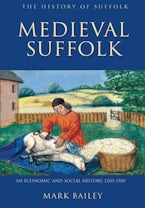
The Decline of Serfdom in Late Medieval England
From Bondage to Freedom
- Description
- Contents
- Reviews
An exciting, fresh look at one of the most important questions of medieval scholarship - the decline of serfdom and its implications.
Scholars from various disciplines have long debated why western Europe in general, and England in particular, led the transition from feudalism to capitalism. The decline of serfdom between c.1300 and c.1500 in England is centralto this "Transition Debate", because it transformed the lives of ordinary people and opened up the markets in land and labour. Yet, despite its historical importance, there has been no major survey or reassessment of decline of serfdom for decades. Consequently, the debate over its causes, and its legacy to early modern England, remains unresolved.
This dazzling study provides an accessible and up-to-date survey of the decline of serfdom in England, applying a new methodology for establishing both its chronology and causes to thousands of court rolls from 38 manors located across the south Midlands and East Anglia. It presents a ground-breaking reassessment, challenging many of the traditional interpretations of the economy and society of late-medieval England, and, indeed, of the very nature of serfdom itself.
Mark Bailey is High Master of St Paul's School, and Professor of Later Medieval History at the University of East Anglia. He has published extensively on the economic and social history of England between c.1200 and c.1500, including Medieval Suffolk (2007).
Scholars from various disciplines have long debated why western Europe in general, and England in particular, led the transition from feudalism to capitalism. The decline of serfdom between c.1300 and c.1500 in England is centralto this "Transition Debate", because it transformed the lives of ordinary people and opened up the markets in land and labour. Yet, despite its historical importance, there has been no major survey or reassessment of decline of serfdom for decades. Consequently, the debate over its causes, and its legacy to early modern England, remains unresolved.
This dazzling study provides an accessible and up-to-date survey of the decline of serfdom in England, applying a new methodology for establishing both its chronology and causes to thousands of court rolls from 38 manors located across the south Midlands and East Anglia. It presents a ground-breaking reassessment, challenging many of the traditional interpretations of the economy and society of late-medieval England, and, indeed, of the very nature of serfdom itself.
Mark Bailey is High Master of St Paul's School, and Professor of Later Medieval History at the University of East Anglia. He has published extensively on the economic and social history of England between c.1200 and c.1500, including Medieval Suffolk (2007).
The Decline of Serfdom and its Historical Significance
The Chronology of Decline: Villein Tenures
The Chronology of Decline: Servile Incidents
The Causes of Decline
Reassessing the Decline of Serfdom: Method and Sources
Walsham-le-Willows
Merton College, Oxford
Aldham
Tingewick and Upper Heyford
The Abbot of Bury St Edmunds
The Dukes of Norfolk
Miscellaneous Manors
The Chronology of the Decline of Serfdom
From Bondage to Freedom: Towards a Reassessment
Appendix: List of original sources used in this study
Bibliography
The Chronology of Decline: Villein Tenures
The Chronology of Decline: Servile Incidents
The Causes of Decline
Reassessing the Decline of Serfdom: Method and Sources
Walsham-le-Willows
Merton College, Oxford
Aldham
Tingewick and Upper Heyford
The Abbot of Bury St Edmunds
The Dukes of Norfolk
Miscellaneous Manors
The Chronology of the Decline of Serfdom
From Bondage to Freedom: Towards a Reassessment
Appendix: List of original sources used in this study
Bibliography
"A powerful corrective to assumed narratives of the decline of serfdom..It is admirably well organized and clearly written, and lends itself to a range of audiences." HISTORY
"This excellent study is an exemplar of qualitatively sensitive, quantitative history at its best. [It] is one of those rare works that demands that textbooks be rewritten or discarded." PARERGON
"Systematic, lucid and representing a monumental archival effort, his book offers a compelling new thesis on the chronology and causes of the end of serfdom, while also managing to reflect on the longer-term implications of that transformation....The result is a landmark in the historiography of English rural society." ENGLISH HISTORICAL REVIEW
"[This book] presents an innovative reconsideration, questioning many of the traditional views on the economy and society of late medieval England and on the character of serfdom. . . . [I]t contributes to the long-debated question of why England pioneered in the transition from feudalism to capitalism." THE HISTORIAN
"
COMITATUS
"In a subject prone to sensationalism and theoretical constructs, [Bailey] sets out the historical evidence and conclusions to be drawn from it with great clarity and is concerned at all times with norms rather than exceptions." AMERICAN HISTORICAL REVIEW
"Original, thoroughly data-based, and likely to set the terms of conversation for some time." SEHEPUNKTE.DE
"Anyone looking for a reliable survey of recent work on late medieval agrarian history will find this part of the book well worth reading. The book's organizing principles are admirably clear from beginning to end and the writing is direct and lucid." THE MEDIEVAL REVIEW
"Bailey's arguments are carefully constructed and powerfully put, and are bound to spark lively debate within the academic community. This makes his book one of the most important contributions to late medieval historiography for many years." SUFFOLK INSTITUTE OF ARCHAEOLOGY AND HISTORY
"Historians of late medieval England have been waiting for a comprehensive history such as this. . . . Bailey challenges existing views on the timing and course of serfdom's decline, linking the economic and personal transformations in the later medieval period to trends found in recent works on the early modern economy." JOURNAL OF BRITISH STUDIES
Paperback
9781783271283
June 2016
$38.95 / £28.99
Hardcover
9781843838906
February 2014
$115.00 / £80.00
Ebook (EPDF)
9781782042280
February 2014
$29.95 / £24.99







